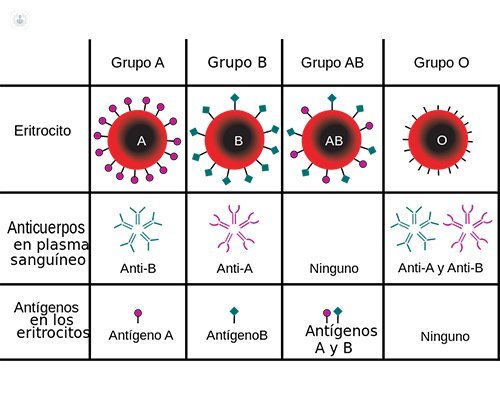Blood group types and their implications
Written by:The ABO system first known blood group system was discovered in 1901. Its name derives from the three groups identified: the antigen A, B antigen, and O without antigens.
How do we receive our blood type ?
The blood type is inherited in the genes, as with the other physical characteristics.
The ABO system is the most important blood group and includes blood groups A, B, O and AB. The following system is Rh in importance, according to which can be positive or negative Rh Rh.
In total there are eight basic blood groups: A, B, AB and O; each of which can be positive or Rh negative.

The importance of the ABO group lies in its great impact on the compatibility of the blood used for transfusion. If we transfused blood group incompatible with our blood we can have such an intense rejection that causes us to death.
How common are blood groups?
The number of people who have a blood group or another varies by race. For example, the B blood type is more common in Asia, while the O group is most common among Europeans.
There are two copies or alleles in each gene. Combinations of these copies (a gene inherited from the mother and one father) give rise to different types ABO. Keep in mind that antigens A and B are dominant, whereas the O antigen is recessive. For example, a person who inherits an A gene and a gene O, will have blood group A.
What is the compatibility of blood groups?
 The great importance of the ABO is the need to know how and why they act against our antibodies. Each person creates antibodies from the first months of life against antigens that do not have. If I Group A, is that I have no antigen A and antigen B. Naturally I will have antibodies that destroy red blood cells with antigen B. Therefore, the presence of antibodies that have created end determining compatibility of our blood.
The great importance of the ABO is the need to know how and why they act against our antibodies. Each person creates antibodies from the first months of life against antigens that do not have. If I Group A, is that I have no antigen A and antigen B. Naturally I will have antibodies that destroy red blood cells with antigen B. Therefore, the presence of antibodies that have created end determining compatibility of our blood.
People in group O have neither A nor B antigen therefore have made antibodies that act against A and B. Therefore, people in the group or just you can transfuse blood is O, which is free of antigens A and B antigens. It is for this reason that it is considered that type O is a universal donor, especially if negative Rh. In that case the blood does not carry antigen A or B or D (which is the main antigen Rh).
People with group O are universal donors, but they can only receive blood from the same group. Instead, people with group AB + are universal receivers. That means they can receive blood from any group, but their blood is only usable for people of the same group.
For more information consult your hematologist .


